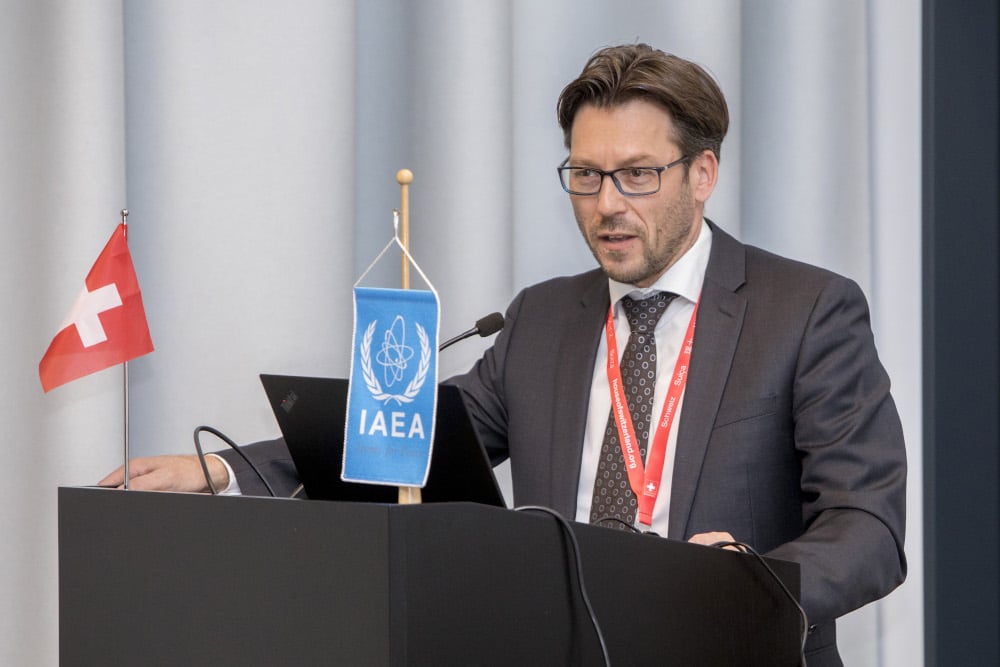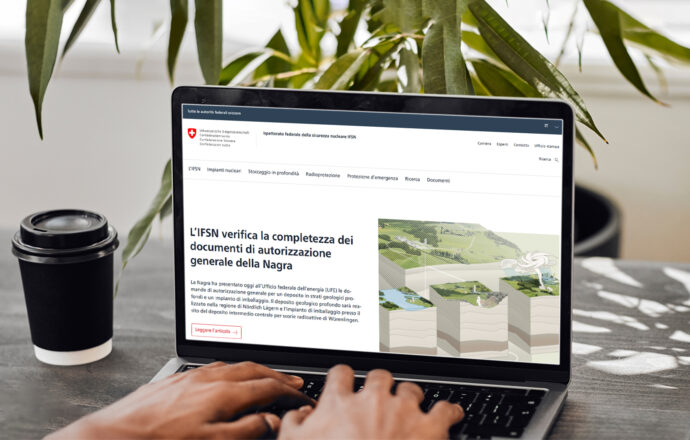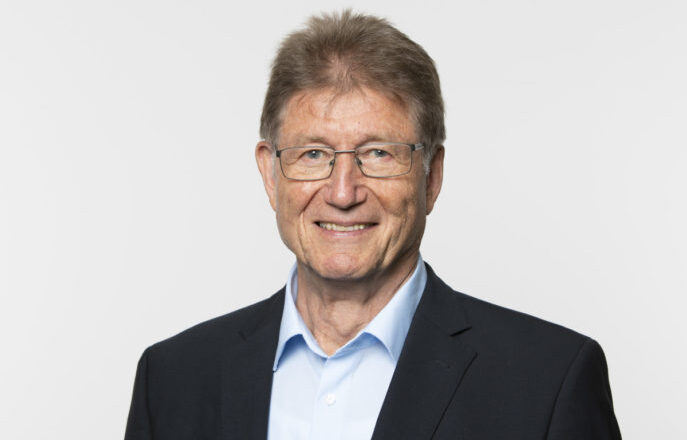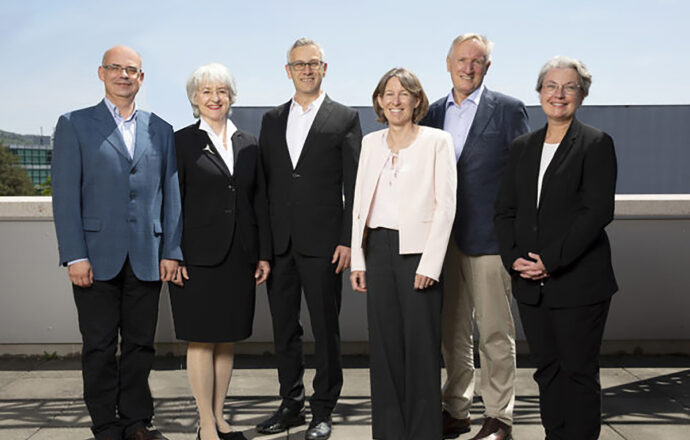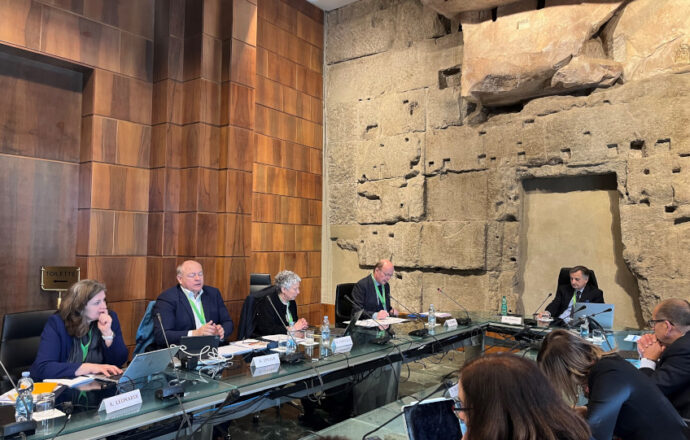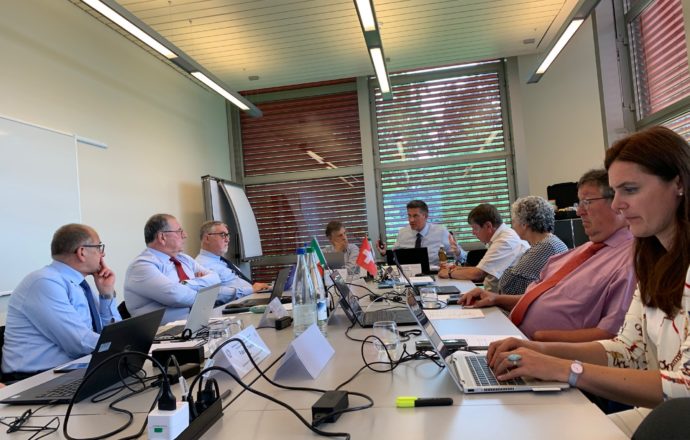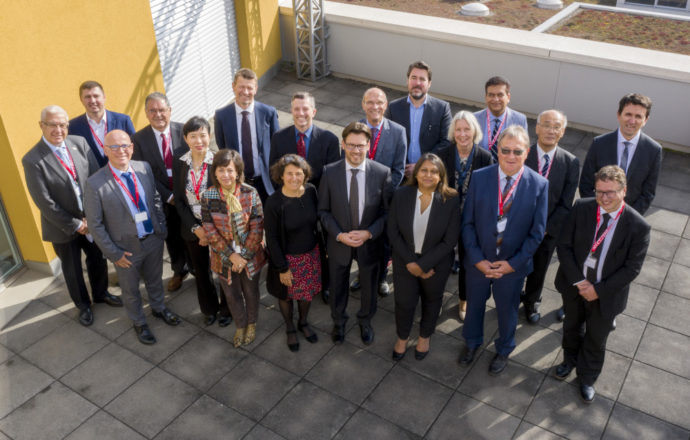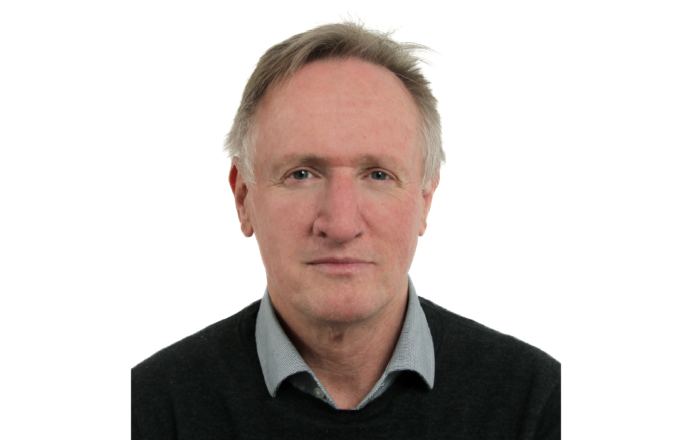«Siamo giunti alla conclusione che l’IFSN è un’autorità di vigilanza progressista, competente e indipendente. L’IFSN è pienamente in grado di adempiere al suo mandato in Svizzera», afferma Petteri Tiippana, Direttore dell’Autorità di vigilanza finlandese STUK, riassumendo i risultati della missione IRRS. Dal 18 ottobre 2021 gli esperti internazionali sotto la sua guida hanno acquisito un quadro dettagliato del sistema di sorveglianza svizzero e dell’operato dell’IFSN. La riunione finale si è svolta il 29 ottobre 2021 presso la sede dell’IFSN a Brugg.
L’Agenzia Internazionale dell’Energia Atomica (IAEA) si avvale dell’«Integrated Regulatory Review Service (IRRS – Servizio di esame regolatorio), il quale è un servizio dedicato ai i suoi stati membri per migliorare e sviluppare la sicurezza nucleare in tutto il mondo.
Il team di esperti ha confermato che il sistema di sorveglianza svizzero, comprese le norme e i regolamenti e l’integrazione nelle leggi, opera nell’interesse della sicurezza nucleare. Tuttavia, la Missione IRRS ha anche formulato raccomandazioni. Ad esempio, in vista delle sfide imminenti – in particolare la disattivazione delle centrali nucleari, lo smaltimento delle scorie radioattive e l’esercizio a lungo termine delle centrali nucleari – la Svizzera ha bisogno di una strategia a livello nazionale per poter mantenere o rafforzare le competenze nel settore nucleare a medio e lungo termine e continuare così a garantire la sicurezza nucleare.
L’IFSN ha anche ricevuto buoni voti dal team IRRS per la sua cultura di vigilanza e sicurezza. Le richieste di adeguamento per migliorare continuamente la sicurezza negli impianti nucleari e la politica di vigilanza dell’IFSN al riguardo sono state sottolineate positivamente. Le note e le raccomandazioni all’IFSN riguardano, ad esempio, l’aggiornamento del regolamento dell’IFSN e le procedure di esecuzione delle ispezioni.
«Ringraziamo vivamente il team IRRS, che ha svolto la missione per conto dell’AIEA», afferma Marc Kenzelmann, Direttore dell’IFSN, al termine della missione. «La revisione internazionale che ha avuto luogo ci aiuta a rafforzare ulteriormente la sicurezza nucleare in Svizzera. Di conseguenza, prendiamo sul serio le raccomandazioni del team IRRS”
Pacchetto di misure: L’IFSN attua le raccomandazioni
La relazione finale ufficiale della Missione IRRS è prevista per i prossimi mesi. L’IFSN la pubblicherà sul suo sito web.
Le raccomandazioni e i consigli della missione alla Svizzera non sono giuridicamente vincolanti. L’IFSN li elaborerà nel quadro di un piano di misure. Una cosiddetta missione di follow-up dell’AIEA valuterà le modalità di attuazione delle proposte di miglioramento nei prossimi anni.
Il comunicato stampa dell’AIEA sulla Missione IRRS in Svizzera:
1 November 2021 | Brugg, Switzerland — IAEA Mission Says Switzerland Is Committed to a High Level of Safety, Sees Areas for Further Enhancement
An International Atomic Energy Agency (IAEA) team of experts said Switzerland is committed to maintaining and strengthening its regulatory framework for nuclear and radiation safety, as the country moves ahead with its plans to phase out nuclear power.
The team added that a key challenge is to keep and to build new safety competence for the future by evaluating anticipated gaps in expertise and in identifying actions required to fill them.
The Integrated Regulatory Review Service (IRRS) team concluded a twelve-day mission to Switzerland on 29 October. The mission was conducted at the request of the Government of Switzerland and hosted by the Swiss Federal Nuclear Safety Inspectorate (ENSI), the national regulatory body for safety and security of nuclear facilities.
Using IAEA safety standards and international good practices, IRRS missions are designed to strengthen the effectiveness of the national regulatory infrastructure, while recognizing the responsibility of each country to ensure nuclear and radiation safety.
The 20 member team, comprised of 17 senior regulatory experts from 15 countries, as well as 3 IAEA staff members, reviewed facilities and activities regulated by ENSI. This included the four Swiss nuclear reactors which generate 35% of the country’s electricity, one operational research reactor and a national interim storage facility for radioactive waste. Switzerland decided in 2011 to phase out nuclear power and, in 2017, Swiss citizens voted in a referendum endorsing a new energy law to promote renewable energy and to approve a ban on new nuclear power plants.
Activities covered during the safety review included emergency preparedness and response, transport, decommissioning, occupational exposure control, environmental monitoring and public exposure, and the safety interface with nuclear security. The IRRS Team also reviewed the licensing process and regulatory guidelines for the ongoing plans for constructing a deep geological waste repository. The mission also used the opportunity to exchange information on national regulatory implications of the COVID-19 pandemic.
The team visit was part of the second IRRS mission cycle to be held in Switzerland, the first was in 2011, with a follow-up in 2015, which also had the same scope to review facilities and activities regulated by ENSI.
“Switzerland has a mature regulatory infrastructure for nuclear safety and radiation protection. As the country phases out its national nuclear power programme, its main challenge at the national level is to maintain and build the competence of parties with safety responsibilities, that is, ENSI and the nuclear industry including NPP licensees,” said IRRS team leader Petteri Tiippana, Director General of the Finnish Radiation and Nuclear Safety Authority – STUK – who led the team.
“ENSI welcomes an IAEA review of our oversight work to better understand the degree of implementation of IAEA safety standards in Switzerland,” said Marc Kenzelmann, ENSI Director General. “The outcomes of the mission will strengthen our regulatory framework by setting out the precise areas to focus on within ENSI’s continuous improvement programme.”
During the mission, the team conducted interviews with management and staff from ENSI and the nuclear facilities, as well as from other national authorities and one non-governmental organization. The team also accompanied ENSI during their inspection and oversight activities at regulated facilities.
The team identified good practices in the area of safety culture. ENSI continuously improves its internal safety culture and promotes the proactive safety culture of licensees through periodic focus groups.
Good performances have been also acknowledged, including:
- The role of ENSI in implementing the regulatory policy and associated requirements for continued safety improvements at nuclear power plants.
- The collaborative dialogue among all Federal and Cantonal authorities involved in the licensing process of nuclear facilities.
- The periodic security background tests for ENSI’s staff, including evaluation of a potential lack of impartiality.
The IRRS Team also identified several recommendations and suggestions to further enhance the Swiss regulatory system and the effectiveness of the regulatory functions in line with IAEA safety standards, including:
- The Government should set up legal provisions to allow for the prosecution of a licensee in addition to an individual.
- ENSI should update its procedures for clarifying the role of inspectors in the enforcement process, including in relation to the immediate corrective actions inspectors are authorized to take.
The final mission report will be provided to the Government of Switzerland in about three months. Switzerland plans to make the report public.
Background
General information about IRRS missions can be found on the IAEA website. IRRS are used to advise Member States on ways to strengthen and enhance the effectiveness of national regulatory frameworks for nuclear, radiation, radioactive waste and transport safety while recognizing the ultimate responsibility of each State to ensure safety in these areas.
The IAEA Safety Standards provide a robust framework of fundamental principles, requirements, and guidance to ensure safety. They reflect an international consensus and serve as a global reference for protecting people and the environment from the harmful effects of ionizing radiation.
